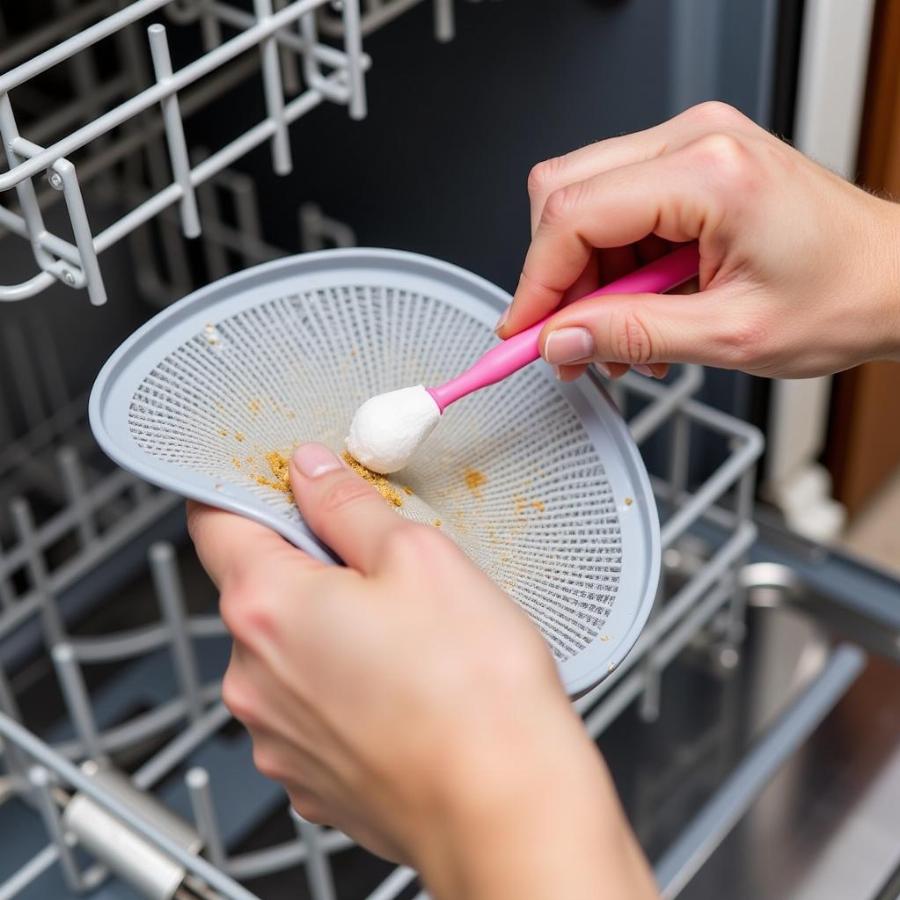Picture this: you’re excited to unload your sparkling clean dishes, only to be hit with a pungent wave of…wet dog? Unfortunately, this scenario is all too common for some dog owners. But don’t worry, a smelly dishwasher doesn’t necessarily mean it’s time to call for a replacement. This comprehensive guide will walk you through the most common causes of dishwasher odor, how to banish that lingering wet dog smell, and provide expert tips for preventing it from returning.
Why Your Dishwasher Might Smell Like Man’s Best Friend (and it’s Not Your Dog!)
While it might seem counterintuitive, the culprit behind that wet dog smell might not be your furry friend directly, but rather the remnants of their presence in the form of food particles, saliva, and yes, even fur. Here’s a closer look at the common reasons:
- Trapped Food Particles: Leftover bits of food, especially pet food, can become lodged in the dishwasher filter, spray arms, and door gaskets, creating a breeding ground for odor-causing bacteria.
- Grease and Fat Buildup: Just like in your kitchen sink, grease and fat from dishes can accumulate in your dishwasher, turning rancid over time and emitting that unpleasant wet dog odor.
- Mold and Mildew Growth: The warm, humid environment inside a dishwasher is a haven for mold and mildew, which thrive in damp, dark spaces and release a musty, often described as “wet dog” smell.
- Hard Water Deposits: If you live in an area with hard water, mineral deposits can build up inside your dishwasher, trapping food particles and contributing to odor.
How to Get Rid of the Wet Dog Smell: A Step-by-Step Guide
Ready to reclaim your dishwasher (and your sense of smell)? Follow these proven steps to eliminate that stubborn wet dog odor:
1. Empty the Filter and Clean the Spray Arms
- Filter: Locate your dishwasher filter (usually at the bottom), remove it, and rinse it thoroughly under hot water. Use a toothbrush and dish soap to scrub away any stuck-on debris.
- Spray Arms: Carefully remove the spray arms (refer to your dishwasher manual if needed) and check for any clogs. Use a toothpick or pipe cleaner to dislodge any food particles.
 Cleaning Dishwasher Filter and Spray Arms
Cleaning Dishwasher Filter and Spray Arms
2. Run an Empty Cycle with Vinegar
Vinegar is a natural deodorizer and cleaning agent that can effectively neutralize odors and break down mineral deposits.
- Vinegar Wash: Place a cup of white vinegar in a dishwasher-safe container on the top rack and run a hot water cycle.
3. Tackle Stubborn Odors with Baking Soda
Baking soda is another powerful odor eliminator that can absorb lingering smells.
- Baking Soda Treatment: Sprinkle a cup of baking soda on the bottom of the dishwasher and run a short hot water cycle.
4. Address Mold and Mildew
If you suspect mold or mildew growth, you’ll need to take additional steps:
- Bleach Solution: Mix a solution of one cup of bleach with one gallon of water. Wearing gloves, carefully wipe down the interior of the dishwasher, paying attention to the door gasket and any visible mold. Caution: Never mix bleach with other cleaning products.
- Ventilation: After cleaning, leave the dishwasher door slightly ajar to allow it to air dry completely.
5. Prevent Future Odors
Prevention is key to keeping your dishwasher smelling fresh and clean:
- Rinse Dishes Before Loading: While modern dishwashers are designed to handle some food residue, it’s a good practice to give dishes a quick rinse to remove larger food particles.
- Clean the Filter Regularly: Make it a habit to clean the filter at least once a month, or more frequently if you have a large family or frequently wash dishes with heavy food residue.
- Use a Dishwasher Cleaner: Periodically use a commercial dishwasher cleaner to remove hard water deposits and sanitize the appliance.
Expert Insights from Dr. Emily Parker, DVM
“As a veterinarian, I often get asked about household odors related to pets,” says Dr. Emily Parker, DVM. “Many people don’t realize that even small amounts of pet food residue can contribute to a smelly dishwasher. Regular cleaning and a few simple preventative measures can go a long way in keeping your kitchen smelling fresh and clean.”
Conclusion
A smelly dishwasher is an inconvenience, but it’s usually an easy fix. By following these simple cleaning and prevention tips, you can banish that wet dog smell for good and enjoy a fresh, odor-free kitchen. Remember, a clean dishwasher is not just about pleasant aromas; it also contributes to a healthier environment for you and your furry family members.
FAQs
Q: Can I use lemon juice instead of vinegar to clean my dishwasher?
A: While lemon juice has some cleaning properties, it’s not as effective as vinegar in neutralizing odors or breaking down mineral deposits.
Q: How often should I run an empty cycle with vinegar?
A: It’s a good practice to run an empty vinegar cycle once a month to keep your dishwasher clean and odor-free.
Q: Is it safe to wash pet bowls in the dishwasher?
A: Yes, it’s generally safe to wash pet bowls in the dishwasher, but using the hot water setting is recommended to kill any bacteria.
Still Having Dishwasher Troubles?
Beaut Dogs is here to help! We provide expert advice and resources for all aspects of dog ownership, including keeping your home clean and pet-friendly. For personalized guidance, contact us at [email protected]. We’re dedicated to helping you create a happy and healthy environment for you and your furry companion.